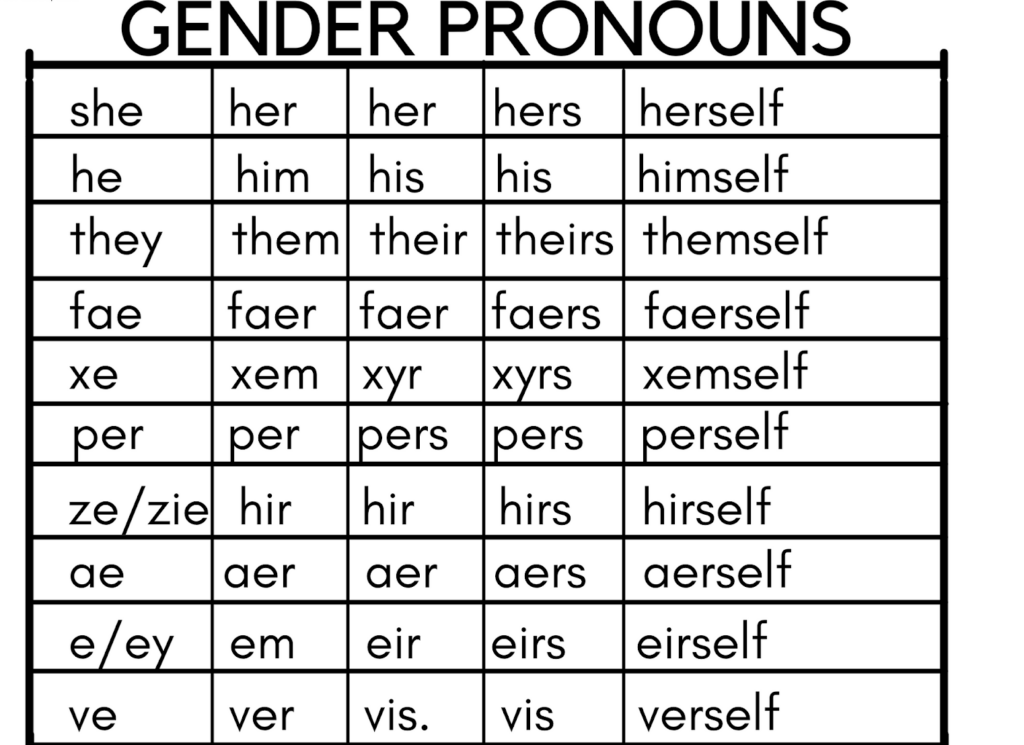What is Gender Non-Conformity (GNC)?
Gender non-conformity refers to individuals whose gender expression or identity does not align with societal expectations or norms associated with the sex they were assigned at birth. GNC individuals may identify as transgender, non-binary, genderfluid, or simply as not conforming to traditional gender roles and presentations.
GNC people may express their gender through various means, such as clothing, hairstyles, mannerisms, or other physical traits that are typically associated with a different gender than the one they were assigned at birth. It’s important to note that gender non-conformity is not the same as sexual orientation, as it relates to one’s gender identity and expression rather than who they are attracted to.
As our understanding of gender evolves, parents and guardians seem to be taking a more proactive approach in providing their gender nonconforming children with a safe and supportive environment. They are researching common terms, reaching out to counselors for either themselves or their children, and trying to find a sense of community for not only their children, but themselves as well. As a genderfluid individual, this is so heartwarming to see.
Examples of Gender Non-Conformity
- A person assigned male at birth who enjoys wearing traditionally feminine clothing or makeup.
- An individual assigned female at birth who prefers a more masculine presentation and uses gender-neutral pronouns.
- A non-binary person who doesn’t identify strictly as male or female and expresses their gender through a combination of masculine and feminine traits.
- Someone who transitions between masculine and feminine expressions depending on their mood or circumstances (genderfluid).
GNC individuals may or may not identify as transgender, and their gender expression can be fluid or consistent over time.
Challenges and Issues Faced by GNC Individuals
Discrimination and Stigma
Unfortunately, GNC individuals often face discrimination, prejudice, and stigma due to societal norms and expectations around gender expression. They may experience harassment, bullying, or discrimination in various settings, including workplaces, educational institutions, and public spaces.
Mental Health Concerns
The stigma and discrimination faced by GNC individuals can take a toll on their mental health. They may experience higher rates of anxiety, depression, and other mental health issues due to the stress of navigating a society that often fails to understand or accept their identity.
Family Dynamics and Acceptance
For GNC individuals, particularly those who come out or express their gender identity at a young age, finding acceptance and support within their family can be a significant challenge. Family members may struggle to understand or accept their loved one’s gender expression, leading to strained relationships and potential conflicts.
Societal Norms and Expectations
GNC individuals often face societal pressures to conform to traditional gender roles and expectations. They may encounter challenges in accessing gender-neutral facilities, using their preferred pronouns, or being recognized and respected for their authentic gender identity.
Although this trend is well underway, a lot of parents still struggle to know where to start. A common question I’m asked by parents and loved ones of gender nonconforming youth is: how can I be supportive?

Step 1 – Listen
Children and teens will tell you who they are. It’s up to us—parents, guardians, and other family members—to listen and believe what they say. Let’s say your teen gathers up the courage to say they are nonbinary, trans, genderfluid, or any other identity that doesn’t align with their gender assigned at birth. How would you respond? With a warm embrace and an “I love you”? Or with the (unfortunately) common, “It’s just a phase”?
Step 2 – Acceptance and Validation
You may not agree with or understand an individual’s chosen gender identity, but that is not required to accept and validate their gender experience. Acceptance and validation can be shown by using their preferred name, appropriate pronouns, and/or helping make adjustments to their appearance such as hairstyles or clothing. Acceptance can also be shown by creating a safe, judgement-free space at home for them.
Step 3 – Be Their Safe Space
We unfortunately live in a society that can be unkind or even hostile to minorities of any kind – racial, sexual, etc. This can often make children and adolescents feel like they don’t have a place or that they don’t belong. If the world at large is challenging for your child to navigate, you have the opportunity to make home their sanctuary.
Give them space and freedom to explore what gender means and feels like to them. This may come in the form of changing identities and/or their gender expression. Gender may not be a static experience for them. For example, an individual who is genderfluid may alternate between gendered pronouns and gender-neutral pronouns, or they may present feminine sometimes and masculine at other times.
Try to remember, this is for them, not you.
As a parent, close friend, partner or ally, potentially frequent changes in identity, including pronouns, may sound overwhelming. Some gender nonconforming individuals use they pronouns (they/them/their), while others fluctuate between they/them, he/him, she/her or even prefer neopronouns (e.g.: xe/xem/xyr).

* This is not an exhaustive list of pronouns, but it’s a good place to start. When in doubt, you can ask what pronouns an individual uses. *
As you can see, there are numerous gender pronouns for people to use. If this is new for you, it may seem a bit confusing and possibly overwhelming. Here’s a quick guide on how to correctly use an individual’s pronouns.
Subject: They walked the dog this morning.
Object: I gave faer a new car.
Possessive: Pers favorite color is orange.
Possessive Pronoun: The fluffy dog is hirs.
Reflexive: Ae loves everything about aerself.
Intersectionality and Diversity within the GNC Community
The GNC community is diverse and intersects with various other identities and experiences. It’s essential to acknowledge and understand the unique challenges faced by individuals who belong to multiple marginalized groups.
Race and Ethnicity
GNC individuals from different racial and ethnic backgrounds may face compounded challenges due to intersecting forms of discrimination and cultural norms. For example, a GNC person of color may experience both racism and gender-based discrimination simultaneously.
Disability
Gender non-conforming individuals with disabilities can face additional barriers and challenges related to accessibility, healthcare, and societal perceptions. It’s crucial to consider the unique needs and experiences of GNC individuals with disabilities to ensure they receive appropriate support and accommodation.
Socioeconomic Status
Individuals from lower socioeconomic backgrounds may face additional obstacles in accessing resources, support, and healthcare related to their gender identity and expression. Economic factors can also influence the level of acceptance and support they receive within their communities.
Age and Life Stage
The experiences of Gender non-conforming individuals can vary greatly depending on their age and life stage. Younger GNC individuals may face different challenges than older adults, such as navigating school environments, familial acceptance, or finding supportive communities.
By acknowledging and understanding the intersectionality within the GNC community, allies can provide more inclusive and tailored support that addresses the diverse needs and experiences of individuals.
How do you keep up?
Well, that’s entirely up to you. The important thing to remember is to make a conscious effort to use their preferred pronouns, name, and, when in doubt, don’t be afraid to ask what their preference is. Refer to people how they prefer to be referred to, not in a way that is convenient for you. This may be uncomfortable for some, especially in the beginning; however, if you’re not addressing them in the way they want to be addressed, then you’re not addressing them at all. Being supportive, in any role (parent, friend, partner, etc), involves accepting and respecting who they are each and every day. Let’s continue to make strides towards a safer, more accepting and inclusive society.
If you need personalized support in learning how to best affirm and embrace your gender non-conforming loved one, don’t hesitate to get in touch with us. Our team is ready to provide guidance, resources, and a listening ear as you navigate this journey together. Showing up for your loved one with acceptance and creating a safe space for them is crucial, and we’re here to help you every step of the way. Reach out to us today to start building a more inclusive world.
Resources
Children:
It Feels Good To Be Yourself (book)
Gender Wheel (book)
16 Great LGBTQIA+ Books for Kids and Teens (list)
Picture Books (list)
Adults:
(PDF) A Guide to Being a Trans Ally – Straight for Equality
(webpage) Understanding Gender – Gender Spectrum
(article) Transgender 101: A Guide to Gender and Identity to Help You Keep Up with the Conversation – Everyday Feminism
Transgender Children of God by Megan Rohrer
(PDF) Biblical Sexuality and Gender: Renewing Christian Witness to the Gospel – Pacific School of Religion
Family Support:
PFLAG – (PDF) Faith In Our Families: Parents, Families, and Friends Talk About Faith, Sexual Orientation, and Gender Identity – PFLAG
Christian – Harbor | FreedHearts | Embracing the Journey | Q Christian Fellowship
Parent/Peer Led – Ally Parents – Stand With Trans | PFLAG
Support In Colorado – Center on Colfax | One Colorado | OASOS | TYES Inc.
Colorado Medical Resources:
Denver Health
Transgender Center of the Rockies
UC Health
CSU Health Network
Planned Parenthood


